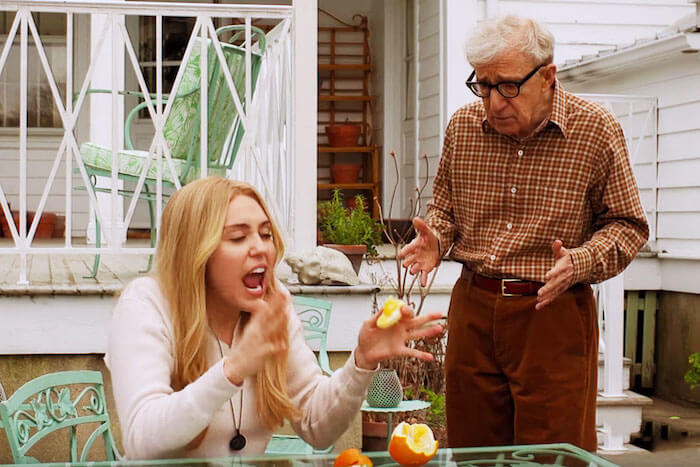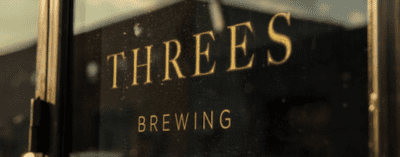Take the Money and Run: Woody Allen’s Lazy Crisis in Six Scenes

Crisis In Six Scenes
Amazon, streaming from September 30
An early scene in Woody Allen’s Manhattan neatly summarizes Crisis in Six Scenes: Isaac, a TV writer, ceremoniously quits his sketch show gig: “It’s embarrassing, antiseptic… there’s not a laugh in there!” Unless it’s a ball game, Allen isn’t partial to television, and while Amazon’s digital arena permits opportunities not granted on airwaves, his interest in heading a series was prompted less by creative exercise than by extra cash. Strange, considering his hurried ethic, simple plots, and self-imposed time restrictions seem format-ready. In his earliest comedies (Take The Money and Run; Bananas; Everything You Wanted to Know About Sex), he knew when the joke would end, be it a vignette or snappy one-liner. His years-long distance from that discipline is just part of what makes Crisis in Six Scenes, his first foray into television (or, appropriately, streaming content), so frustrating. He wastes little time into putting down the format; following a refreshingly booming montage (set to Jefferson Airplane’s non-jazzy groove) of 60s American political upheaval, octogenarian author Sidney (Allen’s return to a starring role) is introduced by a never-heard-from-again narrator as he bargains for a James Dean-inspired haircut from Max Casella. He’s complaining about having to now write for television, and this scene sets up what Sidney has difficulty doing: being a man out of time and flimsily attempting to adapt. It’s a shame Allen is doing the same, but more begrudgingly.
Every new Woody Allen entry becomes reminiscent of all preceding ones, but Crisis is truly a sloppy pastiche: the counterculture montage promises the confrontational craziness of Bananas, the vignette-based narrative of pre-Annie Hall yukfests, the boilerplate neuroses and hypochondria, the misfired exoticism of black people and Jewish stereotypes, and good grief almighty, the vain efforts to silence and push away a beautiful young woman or else face incrimination. Though the rose-tinted cinematography suggests Allen’s expected nostalgia, it’s the closest to him attempting something contemporary; “You ever thought you’d see America like this,” he and his friends wonder aloud as they watch Vietnam and Black Panthers roar across the tube. Still, Allen’s fancy new digital digs can’t house his antiquated riffs on women, activism, and old age any more than Sidney can shelter fugitive revolutionary Lennie (Miley Cyrus), the show’s Patty Hearst sans the kidnapping.
Interrupting his comfy Catskills retirement with ditzy marriage counselor beau Kay (Elaine May), the atonal and bratty Lennie sears Sidney’s limousine-liberal lifestyle, fills Kay’s head with radical literature, and charms betrothed Allen (not Woody, but surrogate John Magaro) into a tizzy over her, or at least for a life in communist Cuba. She also eats all of Sidney’s naval oranges and Fig Newtons, in one of the show’s lame excuses for a recurring gag. Cushy upper-class whites embracing revolution is ripe for satire, but Woody can’t find the joke. Two overlong sequences feature Kay’s book club gushing over Mao’s writings, vowing to burn bras and lay naked in front of draft boards. Lennie arranges her escape while a dorm-ready Che Guevara poster, gracing dainty wallpaper, looms overhead. Meanwhile, one of Kay’s clients decries his wife for going into sex work. There’s room to mock and criticize these contradictions and romantic ideals, but Woody chooses to focus all the attention on himself and his inability to absorb it all.
Clocking in at over two hours, or forty minutes more than the average Woody joint, the episodes are less self-contained than they are fragments of a longer whole. Beyond Woody’s own crisis of unsuccessfully stretching a single-minded narrative via serpentine pacing and overlong exchanges so common to his recent efforts, the real tension lies in Sidney and Kay’s aiding Lennie into Cuban refuge and in Kay’s meetings with distressed couples (including underused Lewis Black and Becky Ann Baker), losing itself in Allen struggling with his engagement to Ellie (Rachel Brosnahan). It’s siphoned through some of Woody’s clumsiest and most soulless dialogue—amidst a script mostly comprised of quotations ripped from the Pseudo-Intellectual Starter Kit—while Magaro mimics his mentor’s nebbishy mannerisms with SNL Celebrity Jeopardy broadness. That Woody would allow such a poor caricature suggests that his partnership with Amazon inspires more apathy than creativity.
You might also like 



















